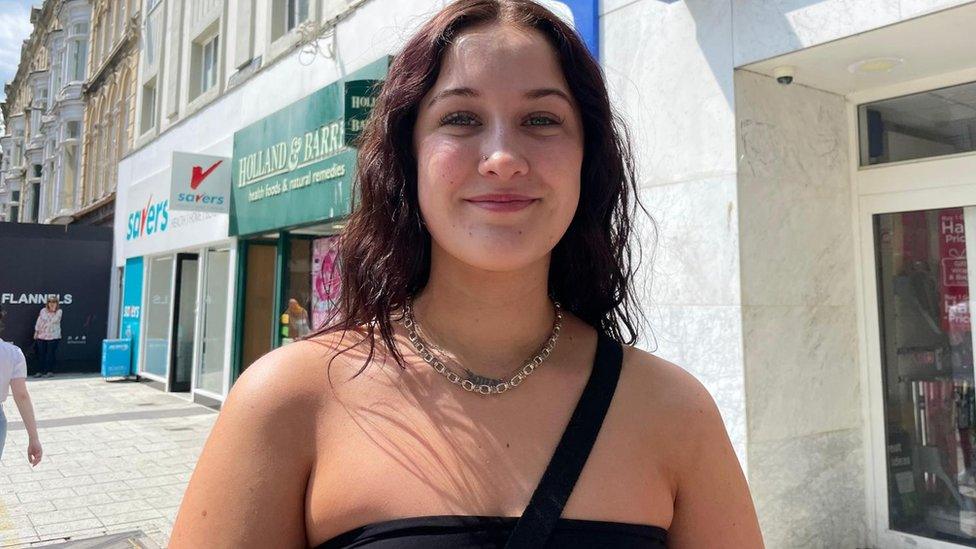Christmas shopping: 'Buy now, pay later schemes a vicious cycle'
- Published

Tamzin says she often racks up £300 a month using buy now, pay later schemes
Using buy now, pay later can be a lifesaver for many people, especially now it's less than three weeks to Christmas.
For some, using firms like Klarna and Clearpay and spreading the payments out is the only way they can afford to buy all the presents they want in time for the big day.
For 24-year-old Tamzin McGrath, using buy now, pay later is the only way she'll be able to get through the festive period.
"I've already got money I need to pay back after using it during the Black Friday sales," she says.
"So I think I will need to use them again for Christmas to get presents."
While paying your debt off interest-free over a short period is handy for many, a lot of the schemes charge a fee if payments are missed.
People are often not given any time to pay the money back if they can't afford it, or able to get compensation if things go wrong.
Tamzin, who admits she's an "impulse spender", says she often goes through phases of using buy now, pay later platforms more than she really wants to.
"It's just a vicious cycle because it seems like such an easy option that you see on nearly every website these days," she says.
'Next month's problem'
A recent Citizen's Advice survey, external found that more than a quarter of British adults will use buy now, pay later to help with Christmas shopping.
And new figures given to BBC Newsbeat by debt charity Step Change, external suggests using the schemes is almost as common as going into an overdraft.
Their survey of nearly 2,000 UK adults found more than half of people in buy now, pay later debt are also struggling to keep up with household and credit card bills.
Tamzin, from Clackmannanshire in Scotland, says she often racks up £300 a month, "which is quite a lot, especially when you have other bills like credit cards at the same time".
"If you've not got the money right now you think it's okay because Klarna and Clearpay can pay for it for you and that becomes next month's problem," she says.

Molly ended up with a bad credit score rating because of an unpaid Klarna bill
Someone who knows all about having money worries because of schemes like this is Molly Plumb.
The 24-year-old currently lives at home with her dad in Hertfordshire and is saving up to move out soon.
But she has to wait a bit longer than she wanted after her credit score was affected by using a buy now, pay later scheme.
"It dropped by half [and] right at the top it said Klarna 'overdue payment'. I was confused because I hadn't used it in so long," she says.
Firing up the app again, Molly discovered a final instalment of £5.60 had failed to go through because her debit card had expired.
"It was a big shock for me as I didn't know it could affect my credit score," she says.
"I didn't get any reminders either about my card needing updating, that was a year ago and my score's only just started building back up again."
Companies use credit scores to help decide whether they should allow someone to have a credit card or approve them for loans.
And in June 2022, Klarna began sharing information with credit agencies about which of its users pays on time and who falls behind.
Step Change say a lot of people don't realise that buy now, pay later is a form of credit and wants them to think about whether they can afford any repayments.
"The festive period can often be a difficult time for people across the country, especially during a cost of living crisis," says Richard Lane, their director of external affairs.
"Anyone seeking to use credit should stop and ask themselves whether the repayments are both affordable and manageable for them."
With Christmas fast approaching here's what you need to know about buy now, pay later schemes
In separate statements, Klarna and Clearpay told Newsbeat they have steps in place to help people avoid overspending.
A spokesperson for Klarna says they "send a number of reminders including texts and emails to ensure customers know what they need to pay back when".
While Clearpay says it tells customers to only buy what they can afford.
Back in 2021, the government said it would regulate buy now, pay later products - with draft plans published in February this year.
But people like Money Saving Expert's founder Martin Lewis, external have recently criticised politicians for not setting a timeframe for making it the law.
A Treasury spokesperson told Newsbeat the government department would "publish a response to our recent consultation once it is finalised".
"We must ensure that regulation of these products is proportionate to ensure borrowers are protected without unduly restricting access," they said.


Related topics
- Published26 December 2022

- Published13 December 2021

- Published21 June 2023

- Published14 February 2023

- Published19 August 2022

- Published4 May 2022
